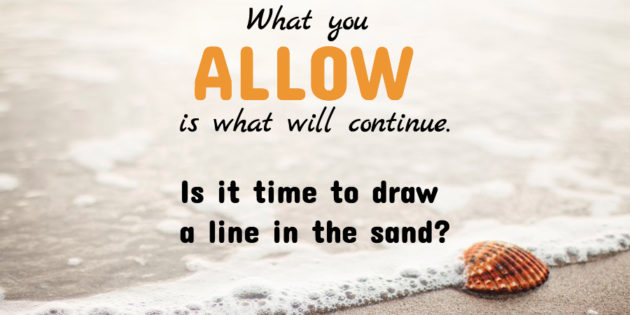“Hey, wait!” you may be saying. “After reading the last few blog posts I get the importance of establishing boundaries, but you just don’t understand who I’m dealing with!” How do you draw a line in the sand when you’re dealing with someone who only cares about themselves.
ISN’T THAT THE DEFINITION OF NARCISSIST?
It’s true that narcissists believe the world revolves around them. I want to make it clear, however, that not all addicts are narcissists. Most will exhibit some narcissistic behaviors, but the source is completely different.
Narcissistic personality disorder is a mental disorder that gives the individual a grandiose sense of their own importance and abilities. They, generally, crave constant admiration and have little or no interest or empathy for the thoughts or struggles of those around them. In their minds, they are always right, rules are for other people, and their frequent angry outbursts are always someone else’s fault.
If you live with an addict, some of these symptoms may feel very familiar. There is, without a doubt, a self-centeredness in addiction. In the addict’s case, however, these reactions aren’t based in mental illness, but in a well-honed self-protection methodology. Past wounding has convinced them they must be constantly focused on their own needs and feelings to keep from being hurt again.
THE COMMON THREAD
No matter what the source of their behaviors, the inward focus of both the narcissist and the addict has kept them from establishing healthy boundaries in their own life or giving proper honor to the limits that other people attempt to set. Their lack of boundaries makes it even more crucial for you to establish good solid boundaries.
WHERE DO YOU PUT THAT LINE IN THE SAND?
Only you can decide that. You, and you alone, must determine what you are willing to accept and what you are not. This requires serious thought. Don’t try to change everything at once. Select one or two things that really bug you to start with.
For instance, if he calls you names or regularly says certain things that are dismissive or belittling, you can draw a line by saying “if you continue to call me names (or the other thing that is offensive to you), I will end our conversation until you can be respectful.”
That’s all you need to say. If you have clearly stated up front what you will not tolerate and what will happen if the behavior continues, you don’t need to provide any further explanation. Let your yes be yes, and your no be no.
The next time he calls you a name, simply state, “As I told you before, if you call me names, I will leave the conversation. Goodbye.”
Then promptly leave the room or hang up the phone. Act quickly and decisively. Do not let him suck you into further conversation, no matter what he says or does.
DON’T EXPECT ONE TIME TO DO IT
Don’t be surprised if he later tries to lure you back into that conversation. He may accuse you of over-reacting, try to start an argument, or even escalate the name-calling. In fact, it’s likely he’ll pull out all the stops and try everything that has helped him remain in control before. Of course, his pressuring will be uncomfortable but remember you are working to change a well-worn pattern of engagement.
That change will only happen if you don’t back down over the long haul. Future name calling has to mean the end of the conversation. EVERY TIME.
Setting boundaries with narcissists and addicts is an ongoing process. You may have to redraw that same line in the sand over and over, until they have learned, without a doubt, that you mean what you say.
Do yourself a service and just EXPECT from the start that it’s going to take many repetitions and a real commitment to consistency to change the old dynamic. Resetting your expectations will substantially reduce your frustration level.
Be kind, but firm. If the new boundary is important to your emotional well-being it is non-negotiable.
NOBODY SAID THIS WOULD BE EASY!
Standing up for yourself may feel very uncomfortable at first—especially if you have had a long history of controlling people in your life. If you’ve never really felt like you’ve had a voice, trying to stretch those vocal cords can be very disconcerting.
Try to find one or two close friends who will be your cheerleaders in this process. There will be times you need someone to remind you that you are not being unreasonable or selfish. You will benefit from having supporters to pray with you and for you.
This is hard stuff. It can feel scary at times—especially if your spouse tends to be combative or volatile.
There are always consequences of our choices. If you continue to say or do nothing about a bad situation nothing is likely to change . . . EVER. You will continue to feel demeaned, trapped and increasingly unacceptable. That can be unbearable and extremely painful.
If, however, you make the brave choice to try to bring about a healthy change in your relationship you could incur your husband’s wrath. That certainly involves pain as well.
Let me caution you, that if you feel that making that choice would put you in any kind of significant physical danger, there may be other, bigger issues and choices that need to be considered beyond merely establishing boundaries. In that case, I would encourage you to seek the advice of a respected pastor or counselor before moving ahead.
THE BENEFITS ARE WORTH IT
Ultimately, you need to choose to do what is best for YOU.
Let me just say that virtually everyone I know who has chosen to draw a line in the sand and do the hard work of establishing and enforcing solid boundaries, has come away feeling stronger, safer, and more confident in themselves as a person. You deserve to feel those things as well.
“Strength and dignity are her garments and she smiles about the future.” — Proverbs 31:25
TODAY’S CHAT: What is your biggest concern about drawing a line in the sand? Share it with us in the response box below.



1 Comment
Elizabeth Vazquez
October 14, 2023I feel lost because I have been with my husband for 27 years but I know he doesn’t love me even though he acts like it to my face it feels fake he tells family and friends he doesn’t love me and he try’s to hurt me with words and actions I fear he will break my heart so severe I may physically die
Leave A Response